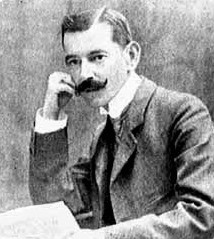- José de Diego
Infobox writer
name = José de Diego

imagesize = 150px
caption = Dr. José de Diego
pseudonym =
birthname =
birthdate =April 16 ,1866
birthplace =Aguadilla ,Puerto Rico
deathdate =July 16 ,1918
deathplace =
occupation = statesman, poet, journalist
nationality = Puerto Rican
period =
genre =
subject =
movement =
notableworks = "A Laura"
spouse =
partner =
children =
relatives =
influences =
influenced =awards =
website = Dr. José de Diego y Benítez (April 16 ,1866 –July 16 ,1918 ), was a statesman, journalist,poet and advocate for Puerto Rico's independence from Spain and from the USA.Early years
De Diego was born in
Aguadilla ,Puerto Rico and received his primary education inMayagüez, Puerto Rico . He then moved toSpain where he graduated from the "Polytechnic College of Logroño". While in Spain, de Diego collaborated with the newspaper "El Progreso " (Progress) which was founded byJosé Julián Acosta and which attacked the political situation in Puerto Rico. This led to various arrests and eventually he returned to the island.Poetry
In 1886, de Diego had an unhappy love affair, with Carmen Echavarría, which led him to write one of his acclaimed poems "A Laura" (To Laura). This poem became very popular among the romantics of that time. He became known as the "Father" of the "Modern Puerto Rican Poetry Movement". Among his most noted poetry books are:
* "Pomarrosas"
* "Jovillos"
* "Cantos de Rebeldía"
* "Cantos del Pitirre"
Confederation of the Spanish-speaking islands in the Caribbean
De Diego returned to Spain and studied law in Barcelona. He received his law degree and continued his studies until he graduated with a doctorate in law in 1892. He then returned to Puerto Rico to advocate for its autonomy from Spain.
De Diego set up his law practice in Arecibo and was the founder of the newspaper "
La República " (The Republic). Together withRomán Baldorioty de Castro , Diego founded the "Autonomist Party" in [1887] and along withLuis Muñoz Rivera andMatienzo Cintrón , he formed a committee which ultimately convinced the Spanish representative in the islandPráxedes Mateo Sagasta to support the idea of autonomy for Puerto Rico. De Diego envisioned the establishment of a Confederation of the Spanish-speaking islands in theCaribbean which would includeDominican Republic andCuba . In 1897 Spain acknowledged Puerto Rico's autonomy, a status which was short-lived.Politician
After the Unites States invasion of Puerto Rico during the
Spanish-American War , theTreaty of Paris (1898) was executed ending the conflict and binding Spain to cede Puerto Rico, Cuba,Guam and thePhilippines as war bounties to theUnited States . De Diego was appointed to the ruling Executive Council of the island by thePresident of the United States William McKinley (1843-1901), a position to which he resigned to pursue the island's right to govern itself. In 1904, he co-founded the "Unionist Party " along withLuis Muñoz Rivera andAntonio R. Barceló .De Diego was then elected to the House of Delegates, the only locally elected body of government allowed by the U.S., which De Diego presided from 1904 to 1917. The House of Delegates was subject to the U.S. President's veto power and unsuccessfully voted for the island's right to independence and self-government and petitioned against imposition of U.S. citizenship to Puerto Ricans. De Diego became known as the "Father of the
Puerto Rican Independence Movement ".Later years
He founded the "Colegio de Agricultura y Artes Mecánicas de Mayagüez" now known as "
University of Puerto Rico at Mayagüez ". De Diego was honored by Spain by being knighted "Caballero de la Raza" (Knight of the Race).José de Diego's right leg was amputated in 1916 due to a
gangrene infection. He died inNew York City onJuly 16 ,1918 during a recital of one of his poems. His remains were returned to Puerto Rico and are buried in the "Cementerio Antiguo de San Juan" (Old San Juan Cemetery), inSan Juan, Puerto Rico .Legacy
José de Diego's memory has been honored in Puerto Rico, by having his birtdate as an official holiday as well as the naming schools, avenues and a highway after him. There is also a school in
Brooklyn, New York , andMiami ,Florida named after him.Partial bibliography
*"Pomarrosas." Barcelona: Imprenta de Henrich y Ca. en Comnadita, 1904.
*"El caso de Puerto Rico y el Bill de tarifas." San Juan: Porto Rico Progress Publishing, 1913.
*"Jovillos." Barcelona: Editorial Maucci, 1916.
*"Cantos de pitirre." Palma de Mallorca: Imprenta Mosen Alcover, 1950.
*"Cantos de rebeldia." Barcelona: Editorial Maucci, 1916.
*"Obras Completas. Nuevas Campañas, el Plebiscito." San Juan de Puerto Rico: Instituto de Cultura Puertorriqueña,
*"Obras Completas. Poesia. Vol. 2". San Juan: Instituto de Cultura Puertorriqueña, 1973.
*Ripoll, Luis. "Antología Poética." España: Palma de Mallorca, 1977.ee also
*
List of Puerto Rican writers
*List of famous Puerto Ricans
*Puerto Rican literature External links
* [http://www.loc.gov/rr/hispanic/1898/diego.html José de Diego - Library of Congress]
* [http://www.preb.com/articulos/cartasjd.htm Articulos] in Spanish
Wikimedia Foundation. 2010.
